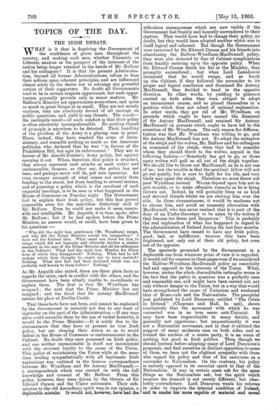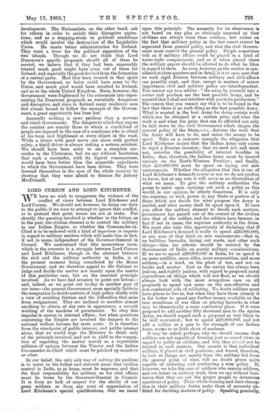W HAT is it that is depriving the Government of the
confidence of grave men throughout the country, and making such men, whether Unionists or Liberals, anxious at the prospect of the interests of the nation being longer retained in the hands of Mr. Balfour and his colleagues ? It is that the present Administra- tion, beyond all former Administrations, refuse to base their actions upon coherent principles, and are influenced almost solely by the desire not to estrange any powerful section of their supporters. No doubt all Governments tend to be in certain respects opportunist, but such oppor- tunism generally prevails only in minor matters. Mr. Balfour's Ministry are opportunists everywhere, and quite as much in great things as in small. They are not merely cautious, they are absolutely devoid of all courage on public questions, and yield to any threats. The result— the inevitable result—of such conduct is that their policy is often absolutely incomprehensible. No guiding thread of principle is anywhere to be detected. Their handling of the problem of the Army is a glaring case in point. There, indeed, they have reached the acme of incon- sistency, and resemble nothing so much as the American politician who declared that he was "in favour of the Prohibition Bill, but agin its enforcement." They are in favour of Mr. Amold-Forster's Army policy, but against carrying it out. When, therefore, that policy is attacked, they always represent such attacks as most unfair and unreasonable, because, as they say, the policy has not been, and perhaps never will be, put into operation. An even stronger example of what comes not merely from bending to the storm, but from bending to several storms, and of pursuing a policy which is the resultant of such impartial bendings, is to be seen in what happened in the House of Commons on Tuesday night. The Government had to explain their Irish policy, but this feat proved impossible even for the matchless dialectical skill of Mr. Balfour. Even he could not make it seem reason- able and intelligible. Mr. Asquith, it is true, spoke after Mr. Balfour; but if he had spoken before the Prime Minister, no answer would, or could, have been given to his questions :— "Why did the right hon. gentleman [Mr. Wyndham] resign, and why did the Prime Minister accept his resignation ? I have not the faintest idea. What cause was there for him to resign which did not logically and ethically involve a similar necessity in the case of the Prime Minister and all his colleagues in the Cabinet? What had the right hon. Member for Dover done of which they disapproved? Nothing. What had he left undone which they thought he ought not to have omitted ? Nothing. What new fact had been disclosed which was not perfectly well known to them before ? Nothing."
As Mr. Asquith also stated, there are three plain facts as regards the crisis, each in conflict with the others, and the Government have been utterly unable to co-ordinate or explain them. The first is that Mr. Wyndham has resigned ; the next that the Prime Minister has not resigned ; and the third that Sir Antony MacDonnell retains his place at Dublin Castle.
That these facts have not been, and cannot be, explained by the Government is certainly not due to any want of ingenuity on the part of the Administration.—If any man alive could reconcile them by the use of verbal dexterity, it would be the Prime Minister.—It is solely due to the circumstance that they have at present no true Irish policy, but are shaping their action so as to avoid defeat in the House of Commons or embarrassment in the Cabinet. No doubt they once possessed an Irish policy, and one neither unreasonable in itself nor inconsistent with the strictest loyalty to the cause of the Union. This policy of maintaining the Union while at the same time dealing sympathetically with all legitimate Irish aspirations was outlined in the famous correspondence between Mr. Wyndham and Sir Antony MacDonnell,— a correspondence which was carried on with the full knowledge and consent of Mr. Balfour. From this policy, however, they were driven by the threats of Sir Edward Carson and the Ulster extremists. Their sub- mission to the old Ascendency spirit was, in our opinion, a deplorable mistake. It would not however, have had the ridiculous consequences which are now visible if the Government had frankly and honestly surrendered to their captors. They would have had to change their policy, no doubt, but they would have adopted another which was in itself logical and coherent. But though the Government were terrorised by Sir Edward Carson and his friends into abandoning the Balfour-Wyndham-MacDonnell policy, they were also deterred by fear of Cabinet complications from frankly entering upon the opposite policy. When Sir Edward Carson shook his fist at the Ministry, they promptly surrendered ; but when Lord Lansdowne intimated that he would resign, and so break up the Cabinet, if they followed the surrender to its proper and logical conclusion and dismissed Sir Antony MacDonnell, they decided to bend in the opposite direction. In other words, by yielding to pressure exerted on both sides they were obliged to adopt an inconsistent course, and so placed themselves in a position which does not admit of rational explanation. In other words, they got rid. of Mr. Wyndhai . on grounds which ought to have caused the dismissal of Sir Antony MacDonnell, and retained Sir Antony MacDonnell on grounds which ought to have led to the retention of Mr. Wyndham. The only reason for differen- tiation was that Mr. Wyndham was willing to go, and Sir Antony MacDonnell was not. To adopt the metaphor of the sleigh and the wolves, Mr. Balfour and his colleagues in command of the sleigh, when they had to consider whom they should throw to the wolves, argued in the following fashion Somebody has got to go, or those nasty wolves will pull us all out of the sleigh together. We should like to throw out MacDonnell, as he is not one of us ; but the trouble is that the pestilent fellow will not go out quietly, but is sure to fight for his life, and very likely may upset the sleigh. Therefore we must throw out poor Wyndham instead. We can depend upon him not to give trouble, or to make offensive remarks as he is being thrown out. Indeed, he will probably bless us as kind and devoted friends whilst we are shoving him over the side. In these circumstances, it would be madness not to choose him, and avoid an unseemly altercation with MacDonnell, who has never realised that it is part of the duty of an Under-Secretary to be eaten by the wolves if they become too fierce and dangerous.' This is probably the real explanation of what has happened in regard to the administration of Ireland during the last four months. The Government have ceased to have any Irish policy, good, bad, or indifferent, because they have been frightened, not only out of their old policy, but even , out of its opposite.
The spectacle presented by the Government is a deplorable one from whatever point of view it is regarded. It would call for censure in these pages even if we considered the Balfour-Wyndham-MacDonnell policy as essentially bad and opposed to the interests of the Union. What, however, makes the whole discreditable imbroglio worse is the fact that the policy in question was a perfectly sane and reasonable one, and might have been carried out, not only without danger to the Union, but in a way that would have strengthened the cause of Unionism and weakened that of Home-rule and the Nationalists. The pamphlet just published by Lord Dunraven, entitled "The Crisis in Ireland" (Chapman and Hall, is. net), shows conclusively that the movement with which he was connected was in no true sense anti-Unionist. It may have been impracticable in many details, and generally not opportune ; but unquestionably it was not a Nationalist movement, and in that it enlisted the support of many moderate men on both sides, and so formed the nucleus of a centre party, it is an omen of nothing but good in Irish politics. Thus, though we should hesitate before adopting many of Lord Dunraven's proposals, and find ourselves in distinct opposition to some of them, we have not the slightest sympathy with those who regard his policy and that of his associates as a surrender to Nationalism. On the contrary, his policy is entirely opposed in its essential spirit to that of the Nationalists. It may in certain cases ask for the same things as the Nationalists ask, but the spirit which inspires the demand is not merely different, but abso- lutely contradictory. Lord Dunraven wants his reforms in order to improve the internal condition of Ireland, and to render her more capable of material and moral development. The Nationalists, on the other hand, ask for reform in order to satisfy their disruptive aspira- tions, and as a stepping-stone to political conditions which would involve the destruction of the Legislative Union. He wants better administration for Ireland. They want a lever for the political separation of the two islands. Though we do not think that Lord Dunraven's specific proposals should all of them be carried, we believe that if they had been reasonably treated much good might have come out of them for Ireland, and especially the good derived from the formation of a central party. Had they been treated in that spirit by the Government, no harm could have come to the Union, and much good would have resulted to Ireland, and so to the whole United Kingdom. Since, however, the Government were frightened by the extremists into repre- senting the Dunraven proposals as essentially dangerous and disruptive, and since in Ireland many moderate men feel almost bound. to follow the example of the Govern- ment, a great opportunity has been lost.
Assuredly nothing is more perilous than a nervous and timid Government. The dangers to which they expose the country are exactly those to which a coach-load of people are exposed in the case of a coachman who is afraid of his team and frightened at every object in the road. While a driver with good nerve can move with perfect safety, a timid driver is always risking a serious accident. We should have been sorry to see a complete sur- render to the Ulstermen, but we say without hesitation that such a surrender, with its logical consequences, would have been better than the miserable expedients to which the Government have been driven. They have lowered themselves in the eyes of the whole country by showing that they were afraid to dismiss Sir Antony MacDonnell.







































 Previous page
Previous page